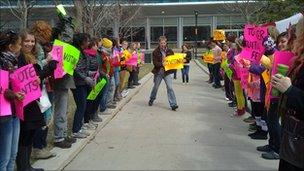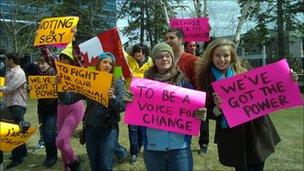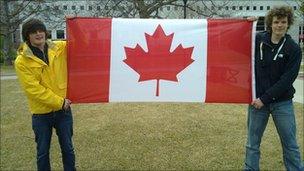'Vote mobs' hope to engage Canadian youth
- Published

Students gathered at Carleton University to try to boost young voters' interest in the Canadian election
A call to action by a comedian popular with young Canadians has sparked a wave of "vote mobs" - upbeat gatherings filmed and uploaded on to YouTube and aimed at encouraging young Canadians to vote in the 2 May election. The BBC's Sian Griffiths attended a recent vote mob at Carleton University in Ottawa.
Chanting "vote mob!" and "vote! vote!" students dressed in brightly-coloured clothing rushed into the university courtyard where speakers blared Snap's I've got the Power.
A student camerawoman filmed the non-partisan event, which organisers hope will push young people to vote - for anyone, regardless of political party.
The camerawoman directed her peers - who waved neon pink, green and orange placards displaying pro-voting messages - to dance, jump, run and cheer feverishly.
As if to illustrate the scale of the challenge faced by Canadian election organisers hoping to increase youth turnout, only 50 out of the 450 students who had confirmed attendance at the vote mob turned up on Monday.
While disappointed with the turnout, organiser Meera Chander hoped the enthusiasm displayed by vote mobs like this would translate into a stronger showing at the ballot box by Canadian youth.
"You go to these events and you see so many students here participating, you kind of feel like you need to vote," she said, explaining that she hoped gentle peer pressure would boost the youth vote.
Youth 'goldmine'
Turnout statistics show Ms Chander has her work cut out for her.

About three million Canadians in the 18-24 age group are eligible to cast a ballot
Just a third of Canada's 18-24 year olds bothered to vote in 2008, according to Elections Canada, the latest figures in a downward trend that began in the early 1970s.
About three million Canadians in that age group are eligible to cast a ballot, a potential goldmine for political parties able to harness their support.
The decrease in the youth vote reflects a general decline in turnout across the Canadian electorate.
In the 1980s, 75% of eligible Canadian voters routinely cast ballots. But in 2008, 58% of Canadians voted, the lowest voter turnout in a century.
Analysts disagree on the causes of the growing Canadian voter apathy.
Some blame election fatigue. When Conservative Prime Minister Stephen Harper defends his minority government in the polls next month, it will be the country's fourth general election in seven years.
In addition, others say voters are increasingly disillusioned with the parties. A cash scandal saw the Liberals voted out of office in 2006, and the Conservative Harper government fell in March after a confidence vote sparked by a finding that it was in contempt of Parliament.
Rallying support online
At the same time, the number of internet outlets that enable people to engage politically has increased. Facebook, Twitter and YouTube have become popular ways in which people can express their views and rally support for issues, rather than just through the ballot box.
Ms Chander, a law student who says she finds politicians "cool", says the buzz around the web vote videos will have an impact.
"We'd like to change that 30% and make it a lot higher," she said.
Comedian Rick Mercer is credited with inspiring the vote mobs.
The 42-year-old award-winning television personality and political satirist is the popular star of a weekly CBC programme, The Rick Mercer Report.
The show features spoofs, a mock news report and humorous escapades across Canada (most recently he took part in a spring moose census).
His weekly "rant", a monologue on the state of the nation filmed in a graffiti-filled alleyway, is also a highlight of the show. At the end of March, he challenged young Canadians to reverse the decline in the youth vote.
"Do the unexpected," he said. "Take 20 minutes out of your day, do what young people all over the world are dying to do: vote."
Guelph University in southwestern Ontario was the first to respond, holding perhaps the world's first vote mob at the end of March.
Thirty-five events have now been planned at campuses across Canada, according to leadnow.ca, a youth democratic participation website.

David Mayer (left) and Nathan Ince (right) helped raise support by joining the mob
But the election campaign falls during a pivotal time for students - the end of the academic year, when many sit end-of-year exams and have to find a new place to live or a job.
Students Nathan Ince and David Mayer, both 19, joined the Carleton University mob carrying a Canadian flag.
Mr Ince, a political science student who described Rick Mercer as a "cultural figure who unites the country", said he was frustrated by Canadian apathy.
"The people who care have to go overboard to get the message out," he said.
David Mayer, an international business student, deemed it "a bit ridiculous" that Canadians complain but do not vote.
'Open government'
After the Carleton University event, organisers invited political candidates to a "post-vote mob meet-and-greet" at Oliver's, the university pub.
Paul Dewar, an MP for the New Democratic Party (NDP) seeking re-election in Ottawa Centre, said many voters simply felt their vote did not count.
In 2008, he explained, the Greens received nearly a million votes but failed to win a single seat in the House of Commons. However, the Bloc Quebecois, which campaigns only in Quebec, received just over a million votes and won 49 seats.
"Something's wrong there," Mr Dewar said.
"We think there should be more fairness, more proportionality in the system," he added, offering democratic reform as a potential remedy.
Scott Bradley, the Liberal candidate, hoped his party's ideas on "open government" would engage more people. He said his party was looking at how the internet could enable people to express their views in Parliamentary committees, for example.
And Jen Hunter of the Greens hoped to engage voters with "the smart economy."
"We need to get better at creating the next economy," she said, explaining that, in her view, the industrial economy was finished.
Damian Konstantinakos, the Conservative Party candidate, did not attend the meet-and-greet. His staff said he was unaware of the event, although student organisers insist he had been invited.
Mr Konstantinakos cites election fatigue and "politicians not committed to running the economy" as reasons why Canadians may choose not to vote.
"We all own the problem" of apathy, he said. He said it was important to "drag" everyone out to vote and "not just people we agree with".
Meanwhile, an empowered Meera Chander hopes that the vote mob phenomenon makes a "huge difference" in the youth voter turnout - and captures the attention of the country's leaders.
"They're going to realise that they need to engage youth," she said.
- Published12 April 2011
- Published27 March 2011
- Published1 April 2011
- Published8 April 2011
- Published5 April 2011